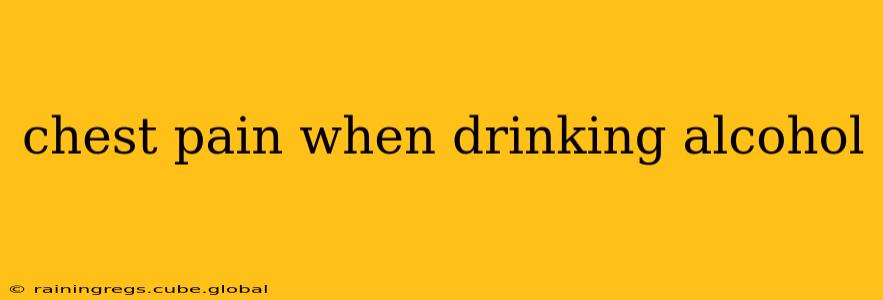Experiencing chest pain after or while drinking alcohol can be alarming. It's crucial to understand that this symptom shouldn't be taken lightly, as it can indicate a range of issues, from relatively benign conditions to serious medical emergencies. This comprehensive guide will explore the various reasons why you might experience chest pain when drinking alcohol, helping you understand when to seek immediate medical attention.
What Causes Chest Pain After Drinking Alcohol?
The connection between alcohol consumption and chest pain is multifaceted. Alcohol can exacerbate existing health conditions and trigger new ones, leading to discomfort in the chest. Here are some key possibilities:
-
Heartburn/Gastroesophageal Reflux Disease (GERD): Alcohol relaxes the lower esophageal sphincter, allowing stomach acid to flow back into the esophagus, causing burning pain in the chest. This is a common cause of chest pain after drinking, particularly if you already suffer from GERD.
-
Angina: For individuals with coronary artery disease (CAD), alcohol can constrict blood vessels, reducing blood flow to the heart. This can trigger angina, characterized by chest pressure, tightness, or pain, often radiating to the left arm or jaw. This is a serious condition requiring immediate medical attention.
-
Heart Attack (Myocardial Infarction): In severe cases, alcohol-induced constriction of blood vessels can lead to a heart attack. Symptoms include crushing chest pain, shortness of breath, sweating, and nausea. A heart attack is a life-threatening emergency requiring immediate medical attention.
-
Panic Attacks: Alcohol can intensify anxiety and trigger panic attacks. These attacks can manifest as chest pain, shortness of breath, rapid heartbeat, and dizziness.
-
Pericarditis: This inflammation of the pericardium (the sac surrounding the heart) can cause sharp chest pain that worsens with deep breaths or lying down. While not directly caused by alcohol, alcohol abuse can weaken the immune system, potentially increasing the risk of developing pericarditis.
-
Aortic Dissection: This is a serious condition involving a tear in the aorta (the main artery carrying blood from the heart). While rare, alcohol abuse can increase blood pressure, potentially contributing to aortic dissection. Symptoms include sudden, severe chest pain, often described as tearing or ripping. This is a life-threatening emergency requiring immediate medical attention.
-
Esophageal Spasm: Alcohol can trigger spasms in the esophagus, causing sudden, intense chest pain. These spasms are usually short-lived but can be quite painful.
Is Chest Pain After Drinking Alcohol Always Serious?
No, chest pain after drinking alcohol isn't always serious. However, it's crucial to differentiate between mild discomfort, such as heartburn, and severe, life-threatening conditions like a heart attack or aortic dissection. The severity, location, and duration of the pain, along with accompanying symptoms, are crucial in determining the cause.
How Can I Tell if My Chest Pain is Serious?
Several factors indicate the need for immediate medical attention:
- Sudden, severe chest pain: Especially if described as crushing, squeezing, or tearing.
- Pain radiating to the arm, jaw, neck, or back: A classic sign of a heart attack.
- Shortness of breath: Difficulty breathing, accompanied by chest pain, is a serious warning sign.
- Sweating, nausea, or lightheadedness: These symptoms often accompany heart attacks.
- Persistent pain: Pain that doesn't subside after several hours or worsens over time.
When Should I Go to the Doctor or Emergency Room?
If you experience any of the above symptoms, especially sudden, severe chest pain, seek immediate medical attention. Don't hesitate to call emergency services or go to the nearest emergency room. Early intervention is crucial in managing life-threatening conditions.
Can Certain Types of Alcohol Cause More Chest Pain Than Others?
While the type of alcohol doesn't directly cause different types of chest pain, the alcohol content and the presence of additives can influence the severity of symptoms. Higher alcohol content beverages can more quickly irritate the stomach lining and exacerbate GERD. Darker liquors may also contain congeners, substances that can contribute to hangovers and potentially worsen some symptoms.
How Can I Prevent Chest Pain After Drinking Alcohol?
- Moderate alcohol consumption: Limit the amount you drink and avoid binge drinking.
- Eat before and while drinking: Food can help slow alcohol absorption and reduce stomach irritation.
- Avoid trigger foods: If you have GERD, identify and avoid foods that worsen your symptoms.
- Stay hydrated: Drink plenty of water to help dilute the alcohol and prevent dehydration.
- Manage stress: Stress can exacerbate chest pain, especially if it's related to anxiety or panic attacks.
This information is for general knowledge and does not constitute medical advice. Always consult a healthcare professional for any health concerns or before making any decisions related to your health or treatment. They can provide a proper diagnosis and recommend the appropriate course of action based on your individual circumstances.
